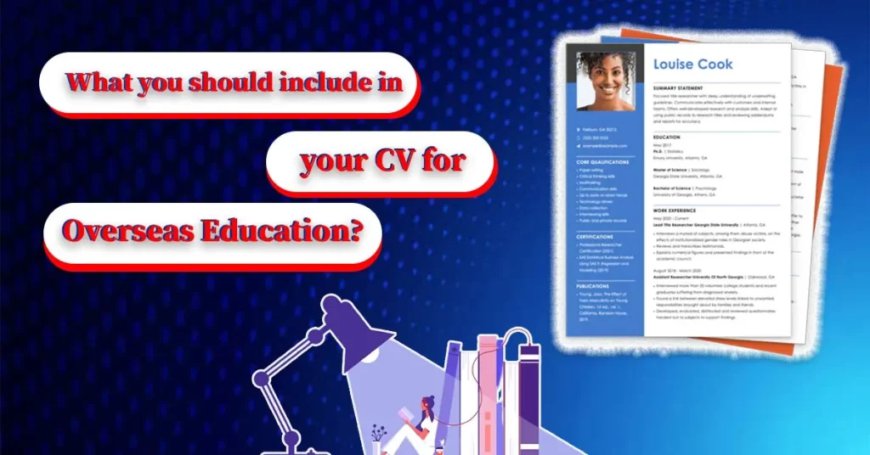What you should include in your CV for Overseas Education?
Your CV is your passport to exciting academic adventures abroad. Here's a roadmap to ensure it showcases your qualifications and grabs the attention of admissions committees.

Your CV is your chance to make a lasting first impression on admissions committees abroad. Unlike a traditional resume focused on work experience, a CV for overseas education highlights your academic achievements and potential. Here's a guide to crafting a compelling CV and navigating the application process:
Essential Elements:
-
Contact Information: Include your full name, email address, phone number (with country code), and current address. Ensure it's professional and easy for them to reach you.
-
Education: This is the centerpiece. List your educational qualifications in reverse chronological order, starting with your most recent. Mention the institution name, location, degree/diploma earned, major/specialization, and graduation year. For impactful programs, briefly mention relevant coursework or projects.
-
Standardized Tests: If required by the program, mention your scores on standardized tests like TOEFL, IELTS, SAT, or PTE.
-
Achievements and Awards: Showcase your academic excellence. List scholarships, awards, distinctions, or recognitions received during your studies. Quantify achievements whenever possible (e.g., top 5% of graduating class).
-
Skills and Activities: Highlight relevant skills that complement your academic profile. These can be language skills, computer proficiency, research experience, or participation in relevant workshops/seminars. Briefly mention extracurricular activities that demonstrate well-roundedness (e.g., leadership roles in clubs).
Crafting Your CV:
-
Tailor it: Research the specific program and university requirements. Highlight aspects of your background that align with their program goals.
-
Conciseness is key: Aim for a one- to two-page CV, depending on your experience.
-
Clarity and Formatting: Use a clear and readable font, maintain consistent formatting, and proofread meticulously for any errors.
Beyond the CV:
-
Personal Statement/Motivation Letter: This is your chance to tell your story. Explain your academic goals, why you're interested in the program, and how your background makes you a strong fit.
-
Letters of Recommendation: Secure strong letters from teachers, professors, or supervisors who can speak to your academic abilities and potential.
Application Process:
-
Research: Identify universities and programs that align with your academic interests. Research deadlines, application fees, and required documents.
-
Prepare Documents: Compile transcripts, standardized test scores, CV, personal statement, letters of recommendation, and any additional documents as specified by the universities.
-
Application Portal: Many universities have online application portals. Carefully fill out the forms, upload required documents, and meet deadlines.
-
Follow Up: After submitting your application, politely follow up with the admissions committee if you haven't heard back within a reasonable timeframe.
Strategies for Success:
-
Start Early: Give yourself ample time to research, gather documents, and craft a strong CV and personal statement.
-
Seek Guidance: Talk to advisors, career counselors, or alumni for guidance on the application process and CV writing.
-
Highlight Your Uniqueness: Showcase your unique experiences, skills, and motivations to stand out from the crowd.
-
Proofread and Edit: Ensure your CV and personal statement are free of errors and typos.
By following these steps and strategies, you can create a compelling CV that showcases your academic potential and increases your chances of securing admission to your dream program abroad. Remember, a well-crafted CV is just one piece of the puzzle. A strong application package combined with a genuine passion for your chosen field will make your candidacy truly shine.
Conclusion:
A well-crafted CV acts as your passport to prestigious universities abroad. By highlighting your academic achievements, relevant skills, and unwavering drive, you can present a compelling case for your candidacy. Remember, a strong application goes beyond the CV. A well-written personal statement, stellar recommendations, and adherence to deadlines are all crucial components.
For those seeking additional guidance, overseas education consultants can be invaluable resources. They offer expert advice on program selection, application processes, CV writing, and interview preparation. With their support, you can navigate the intricacies of international education with greater confidence and achieve your academic goals abroad.
Remember, a strong CV is the foundation for a successful overseas education application. Invest time and effort in crafting yours, and consider seeking guidance from abroad education consultants for a competitive edge.
FAQs
Q1. What are the key sections of a CV for overseas education?
Contact Information (Name, Email, Phone)
Education (Degrees, Diplomas, Awards)
Standardized Tests (if required)
Achievements & Awards (Scholarships, Recognitions)
Skills & Activities (Languages, Projects, Extracurriculars)
Q2. How long should my CV be?
Aim for 1-2 pages, depending on your experience.
Q3. What else should I include besides the CV?
Personal Statement: Explain your goals and motivations.
Letters of Recommendation: Showcase your abilities through endorsements.
Q4. Any tips for making my CV stand out?
Tailor it to the program, highlighting relevant experiences.
Keep it concise, clear, and error-free.
Q5. How can I increase my chances of getting accepted?
Start early, research thoroughly, and seek guidance.
Showcase your unique skills and genuine passion for the field.
